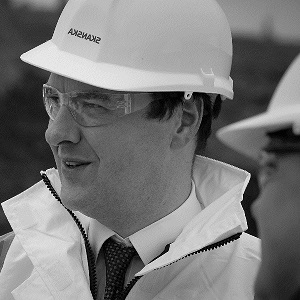Osborne the builder? On housing, the reality doesn’t match the rhetoric
Few of the chancellor’s recent financial statements have passed without a big housing announcement. They follow a familiar pattern. Big numbers are trailed overnight. “Osborne the builder” headlines follow the next morning, accompanied by pictures of the chancellor in a...
Few of the chancellor’s recent financial statements have passed without a big housing announcement. They follow a familiar pattern. Big numbers are trailed overnight. “Osborne the builder” headlines follow the next morning, accompanied by pictures of the chancellor in a hard hat and high vis. Further scrutiny soon shows the reality doesn’t match the government’s rhetoric. Delivery continues to fall well short of what is needed to tackle the housing crisis.
Yesterday’s announcement began the same way, this time the commitment was to build 400,000 “new” affordable homes and to double the affordable housing budget. But will it follow the familiar pattern?
There was more substance than in most announcements because, as the housing charity Shelter has noted, there was a welcome increase in housing investment. The introduction of a higher rate of stamp duty on the purchase of second homes and buy to let properties is also a good thing. But the devil is in the detail and true to form, this announcement is not what it seemed on the day.
The Chancellor’s additional investment is welcome but he is only restoring some of the capital that he cut in 2010. Analysis by John Healey shows that on average this government will be investing £1.7bn a year, 46% less than the £3.1bn annual investment inherited from the last Labour government. The analysis by the OBR has found that the government partly achieves this by actually cutting planned investment in 2016-17 and 2017-18, which is then offset by increases in subsequent years.
The supposed 400,000 “new” affordable homes are also not what they seem. Half of these homes are to be delivered through the government’s Starter Homes initiative which was announced months ago. The need for the government to give £2.3bn to private developers for this initiative is a sign of failure. The Tories claimed before the election, somewhat incredibly, that the 20 per cent discount for buyers would be funded solely through rolling back requirements to build genuinely affordable homes. Analysis by Shelter has also shown that these homes will be unaffordable in 58 per cent of local authority areas.
There was also no mention in the Spending Review of the 275,000 affordable homes previously announced by the government, many of which were due to be for rent for those on the lowest incomes. The OBR’s analysis gives the game away, highlighting that the Government has re-focused investment to shared ownership homes and away from social rented housing. So in truth, very few of the “new” 400,000 homes are new at all.
So, is this enough to tackle the housing crisis, and how should Labour respond?
We’re still building 100,000 fewer homes a year than we need, home ownership has fallen to a thirty year low, there is an acute shortage of genuinely affordable homes and homelessness and rough sleeping have risen rapidly since 2010. While increased investment is welcome, it’s clearly inadequate given the scale of the housing crisis. The government continues to duck the need for serious reform of our housing market, the kind of which was outlined in Labour’s Lyons Review before the election. The Tories continue to tinker with the planning system but this does not address the serious block that our dysfunctional land market represents to increasing housing supply. Investment without reform is like pouring water into a broken sink.
The consequence of the failure to tackle housing supply is borne out by the OBR’s analysis which shows that house prices are estimated to increase by an average of 5 per cent a year, way ahead of average earnings. Those hoping that housing will become more affordable overall will be sorely disappointed. The decision to re-direct capital funding away from homes for those on the lowest incomes will also compound the Tories policies to extend the Right to Buy to housing associations and force the sale of council homes. Affordable housing is set to be decimated.
Despite the inadequacy of the Tories’ polices to tackle the housing crisis, they have made a good fist of owning the political centre ground and the home ownership agenda. Labour’s challenge is to wrench that from their grasp whilst also defending social housing for those on the lowest incomes – no easy feat.
The first task is to largely ignore the numbers (advice I have ignored in this blog). Yesterday’s announcement, like those in the past, contained a blizzard of statistics that will be meaningless and incomprehensible to anyone but the most interested of housing observers. What most people care about is their lived experience and for those who currently want to buy their own home it will continue to get more difficult.
The second task is to demonstrate that Labour backs home ownership; that much more can be done to help people buy their own home; and that Labour has solutions. Most polling shows that people don’t think that the government can do much about tackling the housing crisis so they at least appreciate that ministers are on their side. Labour has to show that there is an alternative and that a combination of reform and investment can help people achieve their dream.
Finally, Labour must defend housing for those on the lowest incomes. Tackling the housing crisis means building more homes of all kinds, not destroying one tenure to boost another. But Labour mustn’t just defend the status quo. To defend social housing, we must increase support for it. That will mean examining reforms that look at contribution and a Labour route from social housing to home ownership.
The Tories don’t have serious answers to tackle the housing crisis but are effective at appearing otherwise. Labour’s task is to match the Tories in presentation and back it up with real substance.

